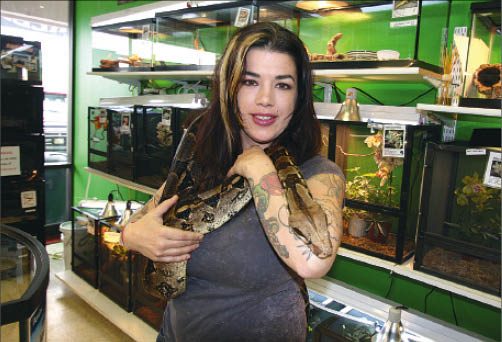
Home » Reptile retailer reaps returns
Reptile retailer reaps returns

April 8, 2010
Wendy Childs spends her days surrounded by hundreds of snakes and frogs and even a few big spiders, and she enjoys the company.
Childs owns and operates Reptile Addictions, which she opened in 2008 and plans to move into bigger quarters next month.
Customers entering Reptile Addictions are greeted by the sound of crickets happily chirping, unaware that they're likely the next meal for a scaly or slippery creature lurking under cover of exotic faux foliage in one of hundreds of terrarium-type enclosures that line the walls and center aisles in the store.
"I have all handleable items," she says. "I don't deal with aggressive species, or anything that wants to eat me."
Although the inventory changes constantly, Reptile Addictions carries a total of more than 300 species of reptiles, amphibians, and a selection of tarantulas and scorpions. Most species are in their own enclosures, which are tightly arranged in a 2,700-square-foot shop in the Bowdish Plaza, at 11518 E. Sprague, in Spokane Valley.
The shop also carries reptile supplies and a variety of reptile foods that ranges from live fruit flies to frozen rabbits.
Childs plans to move Reptile Addictions on May 1 to a 7,000-square-foot space at 13917 E. Sprague, at the northeast corner of Sprague Avenue and Evergreen Road.
The larger quarters will give the shop more room for inventory storage, allowing the business to obtain volume discounts from suppliers, which will help offset the added cost of renting the larger space, she says.
Childs also says Reptile Addictions' breeding facility will be contained in the larger space, although it will be out of public view. Currently, about 2,000 square feet of floor space in her home is dedicated to breeding reptiles and amphibians.
Reptile Addictions has five employees and likely will hire more after the planned move, she says. One additional employee will work in a feeder room, where the shop plans to raise insects and rodents to feed to the pets it sells, Childs says.
Her interest in herpetology—the study of reptiles and amphibians—dates back to her childhood. Childs' mother, who was allergic to warm and fuzzy animals, gave her a Dickerson's collared lizard for a pet when she was 10 years old. That small indigo-blue, Mexico-native lizard was the first of her reptile collection. Eventually, she bred reptiles as a hobby. Then she sold them online to help pay for her hobby before deciding to open Reptile Addictions, her first full-fledged retail endeavor.
"The market here has exceeded what anyone predicted," she claims. "I was surprised. The shop turned a profit from Day One. That's almost unheard of, especially for a small specialty business."
Childs says Reptile Addictions' target market is beginning-to-intermediate reptile keepers.
Childs says she doesn't see chain pet stores as competition.
"We don't carry most of what you will find there," she says. "People who know what we carry know they aren't going to find it in a chain store."
Rasmussen Reptiles, another retailer specializing in reptiles, opened at 9301 N. Division last month.
Keeping creatures
Childs says there's some debate over whether reptiles bond with their keepers.
"Certain species know absolutely who you are," she says. "Whether that's because you feed them, or because they like your companionship, I don't know."
Although Childs breeds some of what she sells in the store and online, she orders much of the store's live inventory from other reptile and amphibian breeders.
"Everything here is captive born and captive bred," Childs says. "I don't sell any wild or farm-raised animals."
About 90 percent of the reptiles and amphibians she sells are juveniles, under 1 year old.
With the exception of a boa that's expected to bear live young soon, and a small friendly dog named Bones that roams the floor freely, all of the animals in the store are for sale.
"I don't usually have big stuff here," Childs says. "I don't have room for big display animals."
The biggest things she stocks are some snakes up to 7 feet long and monitor lizards over 3 feet long.
Prices for reptiles and amphibians range from $25 for 6-inch Guyana collared lizards to $1,800 for a 24-inch blue rhino iguana.
In addition to buying pets at the store, many customers also buy the full terrarium, or mini-habitat, in which their animal is housed in the store, she says.
"It's easy to set up that way, and it puts less stress on the animal when it's moved into a home," Childs says.
Such enclosures typically are priced from $100 to $600, depending on their size.
Childs says keeping reptiles and arranging their enclosures allows her to express her creativity.
"To me, it's an art form of building an ecosystem and doing something cool," she says.
Childs says many species of reptiles and amphibians are easy and affordable to keep.
"Most reptiles, if cared for, won't need veterinary maintenance," she says. "They live 10 to 100 years without additional expense other than feeding."
Latest News
Related Articles




